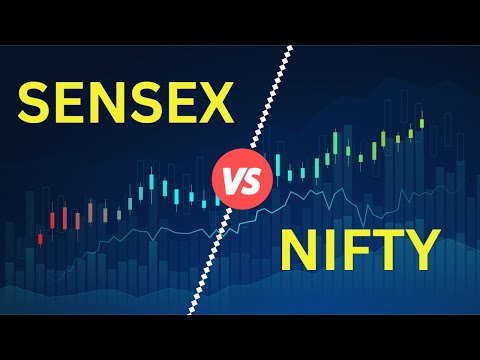Key Differences Between Nifty & Sensex That Impact Your Investments

13 November 2024
Investing in the Indian stock market often brings two popular terms to the forefront: Nifty and Sensex. For both novice and experienced investors, understanding the difference between Nifty and Sensex is crucial, as these indices serve as barometers for the Indian economy and can influence investment decisions. This article delves into the key differences between Nifty and Sensex and how these differences can impact your investments.
Both Nifty and Sensex are stock indices that represent the performance of the Indian stock market. Understanding the difference between Nifty and Sensex lies in their composition, calculation methods, and the stock exchanges they are associated with. While they serve similar purposes, these distinctions give each index unique characteristics in tracking market trends.
What is the Nifty?
Nifty, officially known as the Nifty 50, is the stock market index comprising 50 diversified blue-chip companies listed on the National Stock Exchange (NSE). The name ‘Nifty’ is derived from the combination of ‘National’ and ‘Fifty.’ NSE is one of the two primary stock exchanges in India, the other being the Bombay Stock Exchange (BSE).
Components and Weightage
The Nifty 50 index includes companies from 14 different sectors. These companies are chosen based on their liquidity, market capitalization, and other criteria. The weightage of each company in the Nifty index is determined by its free-float market capitalization.
Calculation
The calculation of the Nifty 50:
Nifty Index = Current Market Value of the Companies / Base Market Value * Base Index Value
The Nifty 50’s base year is 1995, and the base index value is considered to be 1000.
What is the Sensex?
Sensex, or the S&P BSE Sensex, is composed of 30 well-established and financially sound companies listed on the Bombay Stock Exchange (BSE). ‘Sensex’ is a portmanteau of ‘Sensitive’ and ‘Index.’
Components and Weightage
The Sensex consists of companies spread across various sectors, chosen based on their market performance, liquidity, market capitalization, and more. Similar to Nifty, the weightage in Sensex is free-float market capitalization-based.
Calculation
The calculation of the Sensex:
Sensex = Sum of Free-Float Market Capitalization of the 30 Companies / Index Divisor
The base year for Sensex is 1978-79, and its base index value is considered to be 100.
Key Differences Between Nifty and Sensex
Number of Constituents
One of the most striking differences between Nifty and Sensex is the number of companies. Nifty comprises 50 companies, while Sensex comprises 30. This diversification in Nifty can sometimes offer more stability compared to the Sensex.
Stock Exchange Affiliation
Nifty is associated with the National Stock Exchange (NSE), whereas Sensex is linked with the Bombay Stock Exchange (BSE). This means the performance of Nifty is indicative of the movements in the NSE, and the performance of Sensex indicates movements in the BSE.
Sector Representation
While both indices cover a broad spectrum of industries, the number of sectors and the specific companies encompassed vary. The Nifty 50 covers 14 sectors, while the Sensex has companies from around 13 sectors. This slight variation can lead to different performances based on sectoral trends.
Historical Data and Base Year
The base year for Nifty is 1995, with an index value of 1000, whereas for Sensex, the base year is 1978-79, with an index value of 100. This makes the trailing historical data for Sensex more extensive compared to Nifty, which can be useful for long-term trend analysis.
Eligibility Criteria
The eligibility criteria for companies to be included in Nifty and Sensex are different. For Nifty, companies must have a minimum 12% floating stock (shares available for trading), among other criteria. Sensex has its set of criteria, including listing history, trading frequency, and others.
Impact on Your Investments
Volatility and Stability
Given the higher number of companies in Nifty, it might exhibit lesser volatility compared to Sensex. A more diversified index generally performs more stably under varied market conditions. However, individual company performances can still lead to significant movements.
Investment Strategies
Aligning your investment strategy with either Nifty or Sensex can yield different results due to the constituent companies and their sectors. Investors often leverage Exchange-Traded Funds (ETFs) or Index Funds based on these indices for passive investing.
Different Industry Exposure
Considering the sectoral representation, choosing between Nifty and Sensex can provide different industry exposures, leading to varying returns based on sector performance. For example, if tech stocks are performing well and Nifty has a higher weightage of tech companies than Sensex, Nifty might outperform Sensex in such scenarios.
Benchmarking Performance
Many mutual funds and portfolio managers benchmark their performance against these indices. Understanding the differences can help you better gauge fund performance relative to the broader market.
Historical Analysis
Since Sensex has a longer history, it provides more historical data for analysis. Investors looking to evaluate long-term market behaviors might prefer using Sensex as a reference point due to its extended data availability.
Conclusion
Understanding the nuanced differences between Nifty and Sensex is vital for making informed investment decisions in the Indian stock market. Both indices, representing the performance of premier companies, offer insights into market trends and economic health. Investors must consider their investment goals, risk tolerance, and market outlook while deciding which index to track or invest in.
Disclaimer
This article aims to provide an informational perspective on the differences between Nifty and Sensex. Investors are advised to perform thorough research, consider individual investment goals, and evaluate the pros and cons of trading in the Indian stock market before making any decisions. The stock market involves risks, and past performance is not indicative of future returns. Always consult with a financial advisor for personalized investment guidance.




